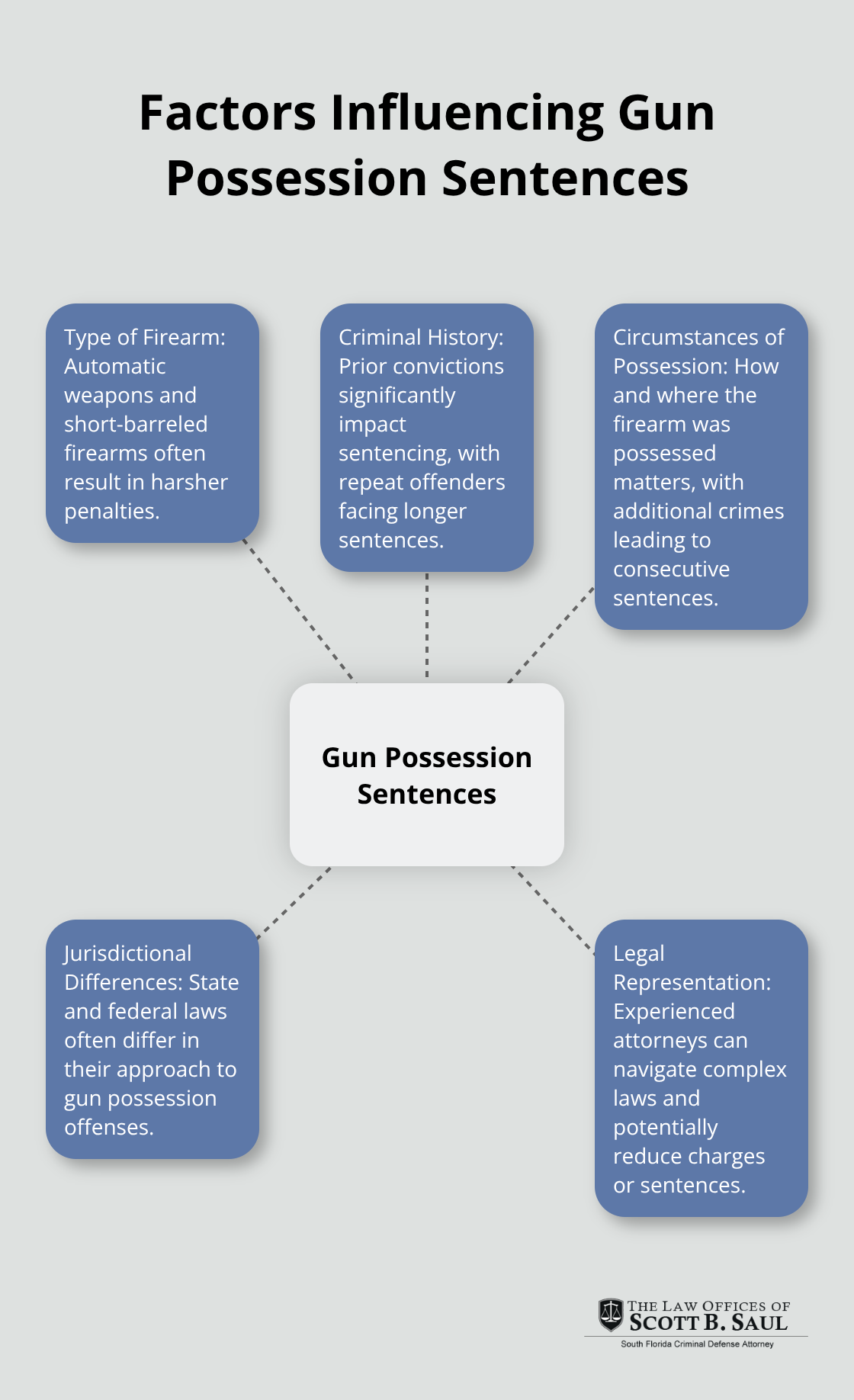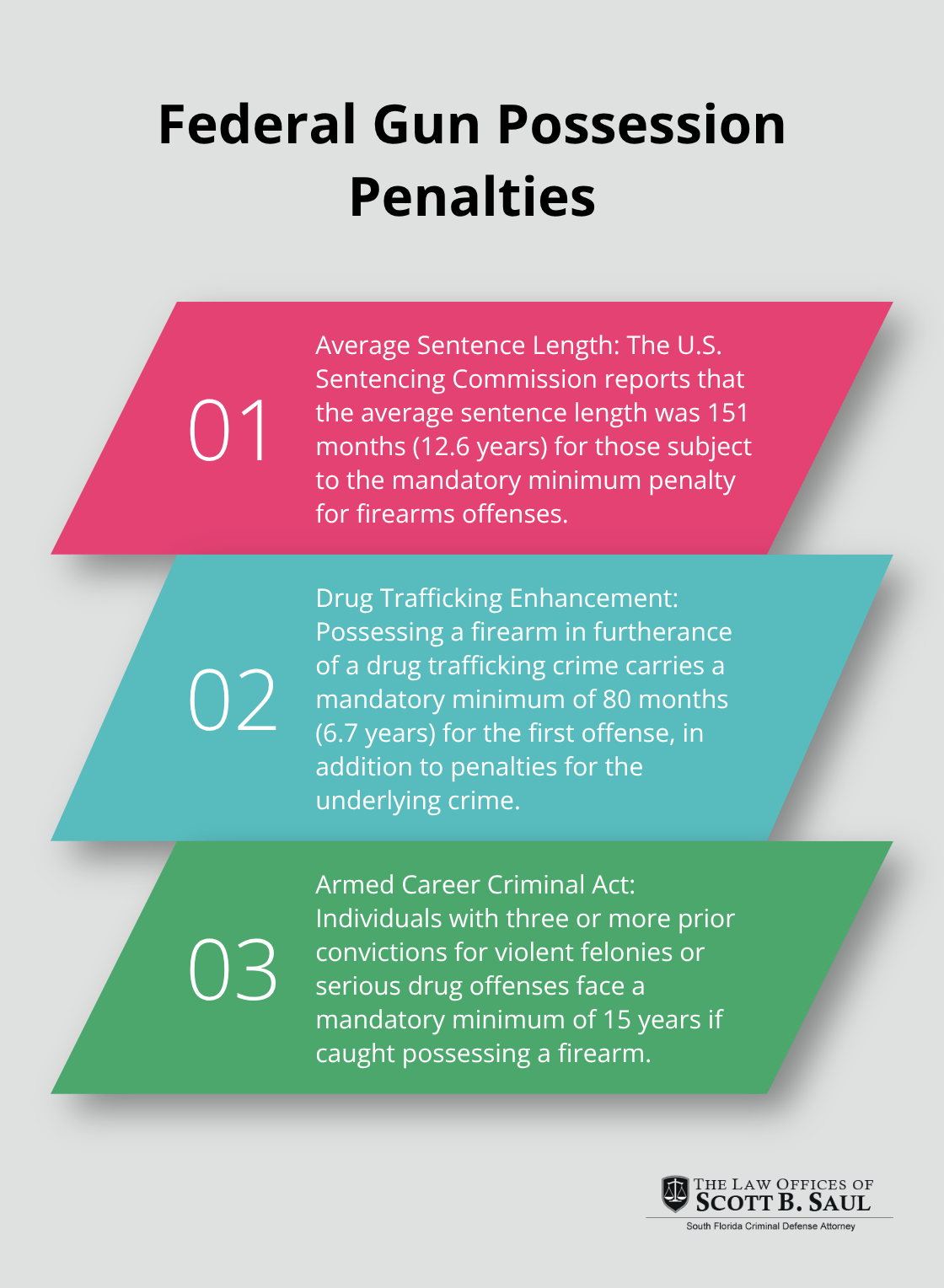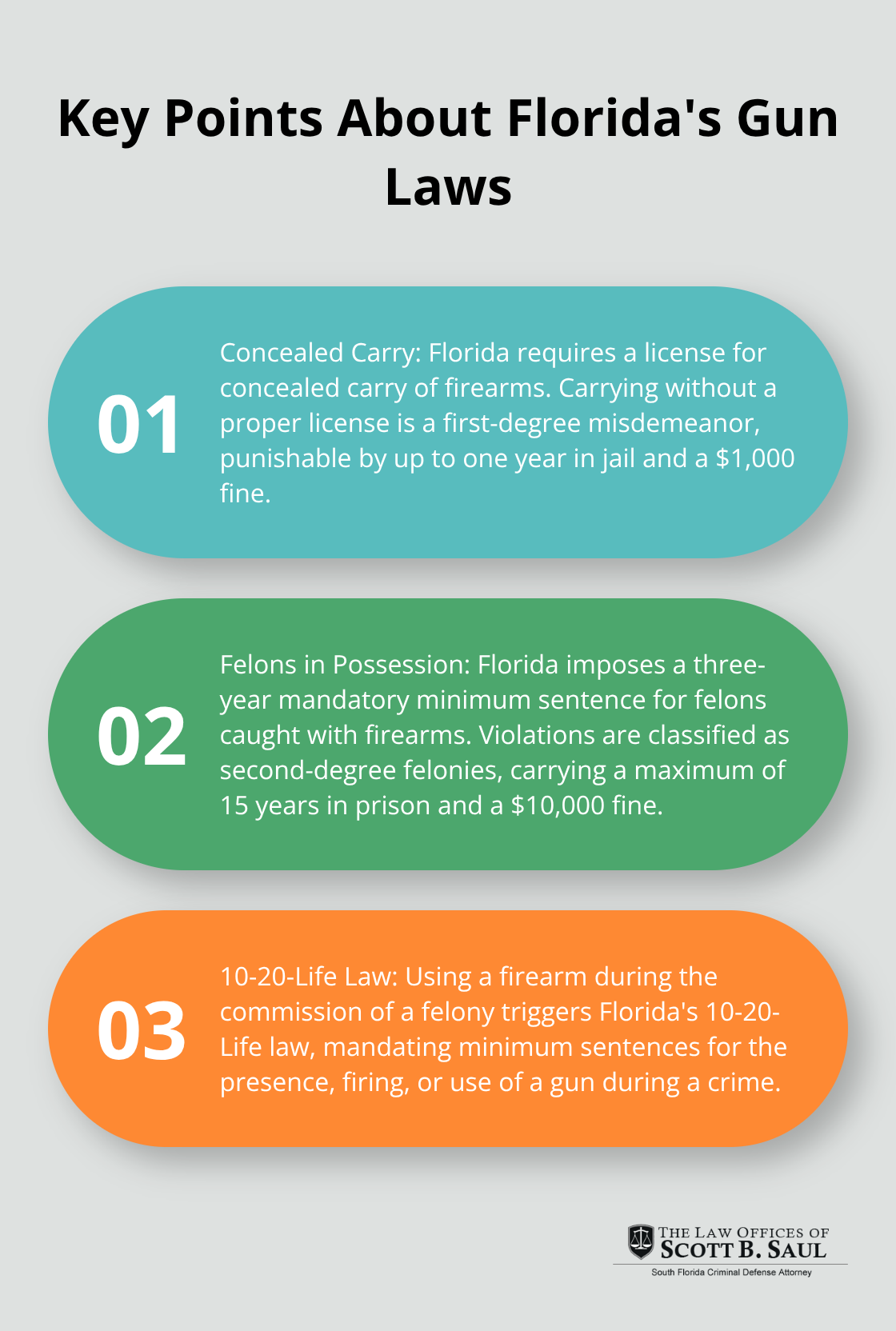How Long is the Sentence for Gun Possession?
By : saulcrim | Category : Criminal Defense | Comments Off on How Long is the Sentence for Gun Possession?
1st Sep 2025

Gun possession charges can lead to severe consequences, including lengthy prison sentences. The question “How many years for gun possession?” doesn’t have a simple answer, as penalties vary widely based on several factors.
At Law Offices of Scott B. Saul, we understand the complexities of gun possession laws and their potential impact on individuals facing charges. This blog post explores the key elements that influence sentencing for gun possession offenses, including federal and Florida-specific laws.
What Determines Gun Possession Sentences?
Gun possession sentences vary widely based on several key factors. Understanding these elements is essential for anyone facing firearms charges.

Type of Firearm
The type of firearm involved significantly impacts sentencing. Possession of automatic weapons, short-barreled rifles, or sawed-off shotguns typically results in harsher penalties. Under federal law, possessing an unregistered machine gun can lead to a 10-year prison sentence.
Criminal History
Prior convictions play a major role in sentencing decisions. A first-time offender might receive probation or a short jail term, while repeat offenders face much longer sentences. The Armed Career Criminal Act mandates a 15-year minimum sentence for felons with three or more prior violent felony or serious drug offense convictions who are caught with a firearm.
Circumstances of Possession
How and where the firearm was possessed matters. Carrying a concealed weapon without a permit in Florida is a first-degree misdemeanor (punishable by up to one year in jail). However, possessing a firearm during the commission of another crime, such as drug trafficking, can result in consecutive mandatory minimum sentences.
Jurisdictional Differences
State and federal laws often differ in their approach to gun possession offenses. Florida, for instance, imposes a three-year mandatory minimum sentence for felons in possession of firearms. Federal penalties can be even more severe, with sentences potentially reaching 10 years or more for similar offenses.
Impact of Legal Representation
The quality of legal representation can significantly affect the outcome of gun possession cases. Experienced attorneys (like those at Law Offices of Scott B. Saul) can navigate the complexities of firearms laws, challenge evidence, and negotiate with prosecutors to potentially reduce charges or sentences.
As we move forward, it’s important to examine the specific federal penalties for gun possession, which often set the baseline for many firearms-related offenses across the country.
Federal Gun Possession Penalties
Federal penalties for gun possession offenses pack a severe punch, often surpassing state-level punishments. The U.S. Sentencing Commission reports that the average sentence length was 151 months for those subject to the mandatory minimum penalty for firearms offenses, underscoring the gravity of these charges.

Mandatory Minimum Sentences
Federal law imposes strict mandatory minimum sentences for various gun possession offenses. For example, possessing a firearm in furtherance of a drug trafficking crime or a crime of violence carries a mandatory minimum of 80 months for the first offense. This sentence runs consecutively to any other sentence imposed (meaning it’s added on top of penalties for the underlying crime).
Repeat offenders face even harsher consequences. A second or subsequent conviction under this statute results in a mandatory minimum of 25 years. These sentences leave judges with little discretion in sentencing.
Enhanced Penalties for Specific Circumstances
Certain factors can significantly increase federal gun possession penalties. The Armed Career Criminal Act (ACCA) stands as a prime example. Under this law, individuals with three or more prior convictions for violent felonies or serious drug offenses face a mandatory minimum of 15 years if caught possessing a firearm.
Another critical enhancement involves the use of certain types of firearms. Possession of a machine gun or a firearm equipped with a silencer in connection with a violent or drug trafficking crime carries a 30-year mandatory minimum sentence.
Federal Sentencing Guidelines
While mandatory minimums set a floor for sentences, the Federal Sentencing Guidelines provide a framework for judges to calculate appropriate sentences. These guidelines consider factors such as the defendant’s criminal history, the specific type of firearm involved, and the circumstances of the offense.
For example, a first-time offender convicted of simple possession of a firearm might face a guideline range of 10-16 months. However, if that same individual possessed the firearm in connection with another felony, the range could jump to 41-51 months or higher.
Impact of Legal Representation
The quality of legal representation can significantly affect the outcome of federal gun possession cases. Experienced attorneys can navigate the complexities of firearms laws, challenge evidence, and negotiate with prosecutors to potentially reduce charges or sentences. This expertise proves invaluable when facing such severe penalties.
As we shift our focus to Florida-specific laws in the next section, it’s important to recognize how state and federal statutes interact in these cases. The interplay between these laws adds another layer of complexity to gun possession charges, making skilled legal guidance even more essential.
Florida’s Gun Laws: Strict Penalties and Complex Regulations
Florida’s gun laws rank among the most complex and strictly enforced in the United States. The Sunshine State imposes severe penalties for various firearm-related offenses, making it essential for residents and visitors to understand these regulations.

Concealed Carry Regulations
Florida law requires a license for concealed carry of firearms. Carrying a concealed weapon without a proper license constitutes a first-degree misdemeanor, punishable by up to one year in jail and a $1,000 fine. Repeat offenses can result in felony charges with even harsher consequences.
The Florida Department of Agriculture and Consumer Services reports over 2.5 million active concealed weapon licenses in the state as of 2023. This high number underscores the importance of proper licensing and education about firearm laws.
Felon in Possession Laws
Florida takes a hard stance on felons possessing firearms. Under Florida Statute 790.23, it’s illegal for convicted felons to possess firearms, with violations classified as second-degree felonies. These offenses carry a maximum sentence of 15 years in prison and a $10,000 fine.
More critically, Florida imposes a three-year mandatory minimum sentence for felons caught with firearms. This means that even if a judge wants to be lenient, they must impose at least three years of imprisonment.
Aggravating Factors in Gun Cases
Several factors can significantly increase penalties in Florida gun possession cases. Using a firearm during the commission of a felony triggers Florida’s 10-20-Life law. This statute mandates minimum sentences for the presence, firing, or use of a gun during the commission of a crime.
The Florida Department of Law Enforcement reported 7,645 arrests under the 10-20-Life statute in 2022, highlighting its frequent application.
Legal Representation in Gun Cases
The complexity of Florida’s gun laws makes expert legal representation not just beneficial, but essential. Attorneys with experience in navigating these intricate laws (such as those at Law Offices of Scott B. Saul) can provide invaluable assistance to individuals facing serious gun charges.
Anyone facing firearms charges in Florida should seek immediate legal counsel to understand their rights and potential defenses. The consequences of a conviction can alter the course of one’s life, emphasizing the need for skilled legal guidance.
Final Thoughts
Gun possession charges result in severe consequences. Sentences vary based on factors like firearm type, criminal history, and jurisdiction. Federal penalties often set high baselines, with mandatory minimums reaching 15 years or more for certain offenses. Florida’s gun laws add complexity, imposing strict regulations and harsh punishments for violations.
Skilled legal representation proves essential when facing gun possession charges. The question “How many years for gun possession?” doesn’t have a simple answer due to the intricate nature of firearms laws. Navigating state and federal statutes, challenging evidence, and negotiating with prosecutors require expertise that can significantly impact case outcomes.
Law Offices of Scott B. Saul brings over three decades of experience to criminal defense across South Florida. Our team (including former federal and state prosecutors) understands the nuances of gun possession laws. We provide personalized attention, comprehensive consultations, and aggressive representation to protect our clients’ rights in gun possession cases.
Archives
- January 2026 (5)
- December 2025 (9)
- November 2025 (8)
- October 2025 (8)
- September 2025 (9)
- August 2025 (8)
- July 2025 (8)
- June 2025 (9)
- May 2025 (9)
- April 2025 (8)
- March 2025 (9)
- February 2025 (8)
- January 2025 (9)
- December 2024 (10)
- November 2024 (5)
- July 2024 (2)
- June 2024 (2)
- May 2024 (2)
- April 2024 (2)
- March 2024 (2)
- February 2024 (2)
- January 2024 (2)
- December 2023 (2)
- November 2023 (2)
- October 2023 (2)
- September 2023 (2)
- August 2023 (1)
- July 2023 (2)
- June 2023 (2)
- May 2023 (2)
- April 2023 (2)
- March 2023 (2)
- February 2023 (2)
- January 2023 (2)
- December 2022 (2)
- November 2022 (2)
- October 2022 (2)
- September 2022 (2)
- August 2022 (2)
- July 2022 (2)
- June 2022 (2)
- May 2022 (2)
- April 2022 (2)
- March 2022 (2)
- February 2022 (2)
- January 2022 (2)
- December 2021 (2)
- November 2021 (2)
- October 2021 (2)
- September 2021 (2)
- August 2021 (2)
- July 2021 (2)
- June 2021 (2)
- May 2021 (2)
- April 2021 (2)
- September 2020 (5)
- July 2020 (4)
- June 2020 (4)
- May 2020 (4)
- April 2020 (5)
- March 2020 (4)
- February 2020 (4)
- January 2020 (4)
- December 2019 (1)
- November 2019 (4)
- October 2019 (4)
- September 2019 (4)
- August 2019 (4)
- July 2019 (5)
- June 2019 (4)
- May 2019 (4)
- April 2019 (4)
- March 2019 (4)
- February 2019 (4)
- January 2019 (4)
- December 2018 (4)
- November 2018 (5)
- October 2018 (5)
- September 2018 (4)
- August 2018 (4)
- July 2018 (7)
- June 2018 (4)
- May 2018 (4)
- April 2018 (8)
- March 2018 (4)
- February 2018 (4)
- January 2018 (4)
- November 2017 (4)
- October 2017 (4)
- September 2017 (4)
- August 2017 (7)
- July 2017 (6)
- June 2017 (4)
- May 2017 (4)
- April 2017 (4)
- March 2017 (4)
- February 2017 (7)
- January 2017 (4)
- December 2016 (7)
- November 2016 (4)
- October 2016 (4)
- September 2016 (10)
- August 2016 (4)
- July 2016 (4)
- June 2016 (4)
- May 2016 (4)
- April 2016 (4)
- March 2016 (4)
- February 2016 (7)
- January 2016 (4)
- December 2015 (5)
- November 2015 (4)
- October 2015 (7)
- September 2015 (4)
- August 2015 (4)
- July 2015 (13)
- June 2015 (9)
- May 2015 (8)
- April 2015 (6)
- March 2015 (4)
- February 2015 (4)
- January 2015 (4)
- December 2014 (4)
- November 2014 (4)
- October 2014 (4)
- September 2014 (3)
Categories
- Adjudication (1)
- Bankruptcy (1)
- Burglary Crimes (3)
- calendar call (1)
- Car Accident (1)
- Criminal Defense (386)
- Cyber Crimes (7)
- DNA (1)
- Domestic Violence (9)
- Drug Crimes (5)
- DUI (12)
- Embezzlement (1)
- Environmental Crimes (4)
- Expungement Law (2)
- Federal Sentencing Law (3)
- Firearm (3)
- Forgery (4)
- General (82)
- Healthcare (3)
- Immigration (1)
- Indentity Theft (1)
- Insurance (5)
- judicial sounding (2)
- Juvenile Crimes (4)
- Manslaughter (4)
- Money Laundering (3)
- Organized Crime (1)
- Racketeering (1)
- Reckless Driving (3)
- RICO (3)
- Sealing and Expunging (2)
- Sex Offense (1)
- Shoplifting (1)
- Suspended Driver's License (1)
- Traffic (4)
- Trending Topics (1)
- White-collar Offenses (1)

